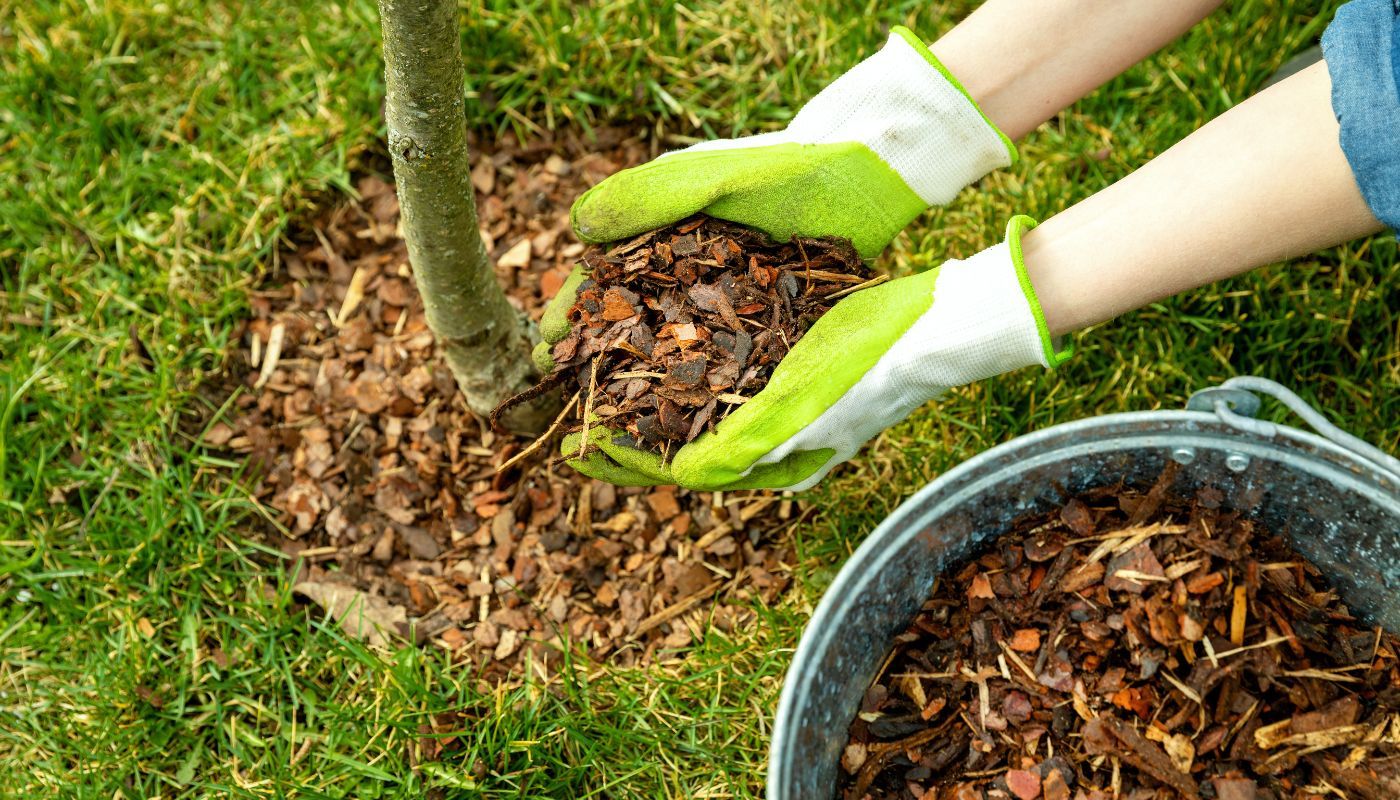LD Total's top tips for maintaining your new garden
Industry News
LD Total's top tips for maintaining your new garden
News

It’s perfectly normal to be intimidated by the cost of investing in property or a new home – just remember that even the most ambitious goal is reachable with careful planning and a bit of self-discipline. With that in mind, let’s look at six ways to help you save a deposit for your very first property, break the rental cycle, and reach your dreams of home ownership.
6 TIPS TO SAVE FOR A DEPOSIT WHILE RENTING
1. GET PROPERTY INVESTMENT ADVICE
Buying land and building a home are one of the biggest purchases you’ll make in your lifetime, so it makes sense that you should seek advice from a professional finance expert or mortgage broker to help you keep your finances in order. A session with a professional will help you to get in the frame of mind to foster good savings habits that will boost your financial situation. It’ll also bring you up to speed on how to create a plan to save up for your new home or property, and how to approach complex subjects like debt and credit score – both of which are important to understand when applying for a loan. The best part is, this advice is usually free, meaning you can get your savings underway without it costing you.

Getting some advice from a financial expert will help you get your ducks in a row for starting a savings plan.
2. MAKE A HOME INVESTMENT PLAN
Creating an investment property plan is perhaps the most important factor when looking at how to save for a house deposit. Your plan should include:
Determining how much to save
Determining how much you need to save depends greatly on a number of factors. For instance, where will you be buying? What is the property market currently like? What is the median purchase price for properties in that area? Are you buying an existing property or a house and land package off the plan? The types of costs involved will inform how much you need for your home deposit and can influence your home loan repayments. Typically, a home loan deposit is around 20 per cent of the value of the property. It’s possible to attain a loan with a lower deposit amount, but this will require an additional fee–Lender’s Mortgage Insurance (LMI), which offsets your lower deposit by covering your lender in the event you default on payments.
Setting a target completion date
A target date for reaching your savings goals is also essential. Without a time frame, it’s easy to lose track of your goals in favour of having a little more financial wiggle room in your day to day life. Your target date depends on your deposit amount as well as your income, though your target date needs to be realistic. Spreading your finances too thin can be problematic if unrelated and unforeseen issues, like sickness or car damage arise, so you should seek to find a balance between maximising savings and still having enough left over to live comfortably.
Repairing your credit score
For an aspiring home buyer, it’s not impossible to get a home loan without a solid credit score, but it is a bit more difficult. You may already have an idea of what your credit report looks like, but if not, it’s essential to check it out. A number of credit reporting companies exist, and they can issue you with a report. If you have a few black marks, it’s not the end of the world – there are actions you can take to address this, and you’ll want to make sure this is taken care of before you start applying for home loans so you don’t get declined. We suggest checking your credit score with a verified credit reporting body with an Australian credit licence, such as Equifax, Experian, or checkyourcredit.com.au. As for expenses? We discuss incomings and outgoings in our next section.
3. LIMIT YOUR EXPENSES
Having a comprehensive list of incoming and outgoing finances will help you identify where you can reduce your spending and increase your savings. Buying things we don’t really need is normal behaviour, but when you tally these purchases up you’ll be surprised how much unnecessary spending you do. We often justify things like barista-made coffee as a daily necessity, or heavily discounted items as too good a deal to pass up. In reality, there’s likely coffee at your office, and even if you purchase an item for 50 percent off, 100 per cent of that money is not going to your savings.
You could also look at things like your mobile phone plan and your rent. Is there a less expensive phone plan, or a cheaper rental property available? Many young people in Australia are moving into their family homes to reduce rental costs and boost savings. While this isn’t an option for everyone, it’s worth exploring any opportunity you have to limit your spending.
Single parents may also be able to take advantage of services like Share Abode – a company that helps these parents network and find others to co-rent with. Further, you could offset some of your rental costs with short-term subleases via AirBNB or HomeAway – though be sure to get approval from your landlord first!
Gym memberships can also tie up your excess funds. There are plenty of opportunities to exercise in local parks, whether you’re jogging or working out on an outdoor gym. Many communities have free exercise groups which offer both a great way to stay fit and a great opportunity to interact with other people in the community. Finally, switch off the lights in your house and turn your appliances off if you’re not using them – even small savings on your utilities bills add up over time.

You might be surprised how small purchases like your daily coffee add up over time.
4. SET MINI GOALS
Setting savings benchmarks is a great idea. Instead of stressing about the full deposit amount, break up your target into smaller, more achievable goals. These smaller goals keep you on track and also provide a sense of accomplishment – even if it’s just putting your spare change into a jar, you never know when a few dollars cash might come in handy. Getting to your target is a process, and because you don’t truly reap the benefits until you’ve hit the target and secured your land, you should count your wins where you can.
5. CREATE A DEDICATED INVESTMENT PROPERTY SAVINGS ACCOUNT
However you manage your finances, it’s a good idea to set up a brand new, high interest savings account specifically for your deposit savings. A high interest account will help you get to your goal quicker, and having a specialised bank account just for your deposit savings means that you can easily keep track of your balance as it grows. It may be worth shopping around to find an account that has great interest rates and low fees.
Many high interest savings accounts offer very attractive introductory interest rates – usually for four months before reverting to standard rates – and these can be a great way to give your savings a kickstart. Look for a savings account with a strong introductory rate as well as a good variable, this is the key to maximising what you earn in interest. Long-term deposit savings accounts can also be a good way to use interest to your advantage. In this case, you’ll put your money into this account for a set period, usually 12 months to 10 years, and while you can’t touch the funds during this period, it’s a great way to secure a better interest rate, and put your savings to work earning for you. Find the account that works for you at finder.com.au – but be sure to check out the conditions first.

A dedicated savings account will help you keep track of your progress.
Consider a property manager
Once you’ve made your purchase, a property manager will greatly assist you in managing maintenance costs. When it comes to owning property, whether as an investment to rent out or as a new home, property managers are crucial. Not only do they help you handle expected rental income, but they can safely assess potential tenants, ensuring only respectful individuals rent your space. They offer a wealth of knowledge, and their expertise can help simplify the complexities of property investing while also ensuring that your investments yield optimal capital growth. Property managers offer a blend of operational efficiency and peace of mind, making them an indispensable part of the property investment journey.
6. TAKE ADVANTAGE OF THE CONCESSIONS AVAILABLE
As you’re saving to purchase your first house, there are a few concessions available to make it easier.
First Home Owner Grant (FHOG)
First and foremost, the FHOG scheme is set up to help Australian home buyers take their first step onto the property ladder. FHOGs are available in each state, though they all have slightly different eligibility criteria and provide different amounts. All FHOGs offer a lump sum that can make a significant difference in what you’re required to save. Check out the FHOG details in your state for more information.
First Home Super Saver (FHSS)
You also may be able to reach your savings goals faster by taking advantage of the FHSS. This scheme allows you to save money by contributing it to your super fund. Because your super is subject to concessional tax treatment (it’s taxed at a lower rate than your income), you can meet your target a little faster. The FHSS scheme also has limits and restrictions, so find out whether you’re eligible here.
Family Home Guarantee (FHG)
The FHG forms the second half of the Australian Government’s Home Guarantee scheme. It acts as an initiative by the Australian Government to support single parents with at least one dependent child in purchasing a home. This scheme allows eligible single parents to buy a home with a minimal deposit without the need for Lender Mortgage Insurance (LMI). The National Housing Finance and Investment Corporation (NHFIC) guarantees a portion of the purchase price, ensuring the lender that loan repayments will be covered if the buyer faces difficulties.
First Home Guarantee (FHBG)
The FHBG is another initiative overseen by the Australian Government to assist first home buyers. This scheme enables eligible buyers to purchase a home with a minimal deposit, without the need for LMI. Housing Australia guarantees a portion of the purchase price, providing assurance to lenders.
Regional First Home Buyer Guarantee (RFHBG)
The RFHBG is a part of the Home Guarantee Scheme, designed to support eligible regional home buyers. This initiative aims to help these buyers purchase a home in a regional area with as little as a 5% deposit, without the need to pay Lenders Mortgage Insurance. Housing Australia guarantees a portion of the home loan from a participating lender, ensuring that eligible buyers can secure a home without the financial burden of a large upfront deposit. It’s essential to note that the RFHBG is specifically for regional areas, excluding major capital city areas. Eligible property types under this scheme include existing houses, townhouses, apartments, house and land packages, and off-the-plan properties.
Further incentives
Beyond the national schemes like the First Home Guarantee and the Family Home Guarantee, there may be additional incentives specific to your state. Often, these incentives take the form of concessional stamp duty rates, so it’s worth doing the research to find out if there is any other assistance available to your region.
Outside of government-provided concessions, there are a few other options to help you reach your goals faster. One of these is to get a guarantor loan. In this situation, you’d have a guarantor (typically a family member) assume responsibility for your mortgage repayments if you default, which means a money lender will consider you a lower risk and you can secure a loan at a far lower deposit. A guarantor loan also eliminates the need to pay Lender’s Mortgage Insurance.
Some lenders will also let you use your rent payments as “proven savings”. In this situation, you would provide documentation showing your rent payments over a period of time. Your ability to do this would be seen as essentially the same as making mortgage repayments, and so the lender will again see you as a much lower risk. Of course, in this scenario, you need to make sure you have a history of paying rent on time.
They say that the journey of a thousand miles begins with a single step, and the same is true for saving enough money to put a deposit on land or a new home and land package. It may seem daunting, but if you follow our advice, you’ll reach your goals soon enough. If you’re ready to see what your dream property looks like, get in contact with the team at Satterley.